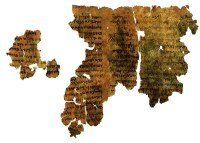 Pseudepigrapha (from Ancient Greek pseudes = "false", epigraphe = "inscription"; see the related epigraphy) are falsely attributed works, texts whose claimed authorship is unfounded; a work, simply, "whose real author attributed it to a figure of the past." For instance, few Hebrew scholars would ascribe the Book of Enoch to the prophet Enoch, and few liberal Christian scholars would insist today that the Third Epistle of John was written by John the Evangelist, or that the Second Epistle of Peter was written by Saint Peter. Nevertheless, in some cases, especially for books belonging to a religious canon, the question of whether a text is pseudepigraphical or not elicits sensations of loyalty and can become a matter of heavy dispute. The authenticity or value of the work itself, which is a separate question for experienced readers, often becomes sentimentally entangled in the association. Though the inherent value of the text may not be called into question, the weight of a revered or even apostolic author lends authority to a text: in Antiquity pseudepigraphy was "an accepted and honored custom practiced by students/admirers of a revered figure". This is the essential motivation for pseudepigraphy in the first place.
Pseudepigrapha (from Ancient Greek pseudes = "false", epigraphe = "inscription"; see the related epigraphy) are falsely attributed works, texts whose claimed authorship is unfounded; a work, simply, "whose real author attributed it to a figure of the past." For instance, few Hebrew scholars would ascribe the Book of Enoch to the prophet Enoch, and few liberal Christian scholars would insist today that the Third Epistle of John was written by John the Evangelist, or that the Second Epistle of Peter was written by Saint Peter. Nevertheless, in some cases, especially for books belonging to a religious canon, the question of whether a text is pseudepigraphical or not elicits sensations of loyalty and can become a matter of heavy dispute. The authenticity or value of the work itself, which is a separate question for experienced readers, often becomes sentimentally entangled in the association. Though the inherent value of the text may not be called into question, the weight of a revered or even apostolic author lends authority to a text: in Antiquity pseudepigraphy was "an accepted and honored custom practiced by students/admirers of a revered figure". This is the essential motivation for pseudepigraphy in the first place.More...


No comments:
Post a Comment